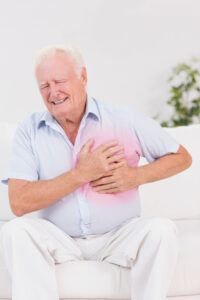
Seniors who have high blood pressure, high cholesterol, or other risk factors for a heart attack should know the warning signs of a heart attack and always take them seriously. It’s recommended that seniors who are aging in place have elder care at home.
Elder care can help seniors around the house and help them with errands and other tasks. But most importantly, having elder care means that seniors won’t be alone if they fall, have a heart attack, or have a stroke. There will be someone with them to get medical help immediately.
If seniors start to experience any of these warning signs of a heart attack they should call for emergency help immediately. Don’t drive to the hospital, call an ambulance. Take these symptoms seriously:
Chest Pain or Discomfort
This is often the most common and recognizable symptom. Seniors may describe it as a feeling of pressure, squeezing, fullness, or pain in the chest that may come and go. It can last for a few minutes or be continuous.
Often seniors mistake chest pain or discomfort for gas. But chest pain doesn’t have to be severe to indicate a heart attack. That’s why it’s important for seniors to get a medical checkup if they are experiencing any chest pain that doesn’t dissipate.
Radiating Pain
The pain from a heart attack may radiate to other areas of the upper body. Seniors may feel discomfort in their arms, neck, jaw, back, or even the stomach. This pain can be intense and is typically on the left side of the body. Women may experience radiating pain in the back of their neck or shoulder rather than in their jaw.
Shortness of Breath
Seniors experiencing a heart attack may have difficulty breathing. They may feel like they can’t catch their breath, and this symptom can occur with or without chest pain.
Nausea or Vomiting
Feeling nauseated or actually vomiting can be a warning sign of a heart attack in seniors. These symptoms are often mistaken for gastrointestinal issues.
Lightheadedness or Dizziness
Seniors may feel lightheaded or dizzy, and in some cases, they may even faint. This can be due to a decrease in blood flow to the brain.
Cold Sweats
Profuse sweating, particularly cold sweats, can be a sign of a heart attack in seniors. These sweats often accompany other symptoms like chest pain and shortness of breath.
Extreme Fatigue
Unusual fatigue or weakness, especially if it comes on suddenly and without exertion, can be a subtle sign of a heart attack in seniors.
Confusion or Cognitive Changes
Some older adults may experience confusion, memory problems, or a change in mental alertness during a heart attack.
The symptoms of a heart attack can vary from person to person, and some individuals, especially seniors, may not experience the classic symptoms like severe chest pain. Women and older adults may be more likely to have atypical symptoms, such as shortness of breath, nausea, or extreme fatigue, instead of chest pain. If there is a possibility that a senior may be having a heart attack call for emergency help. Don’t wait.
If you or an aging loved-one is considering elder care in Hollywood, CA please contact the caring staff at Nu Care Inc. today at. 800-505-6890

